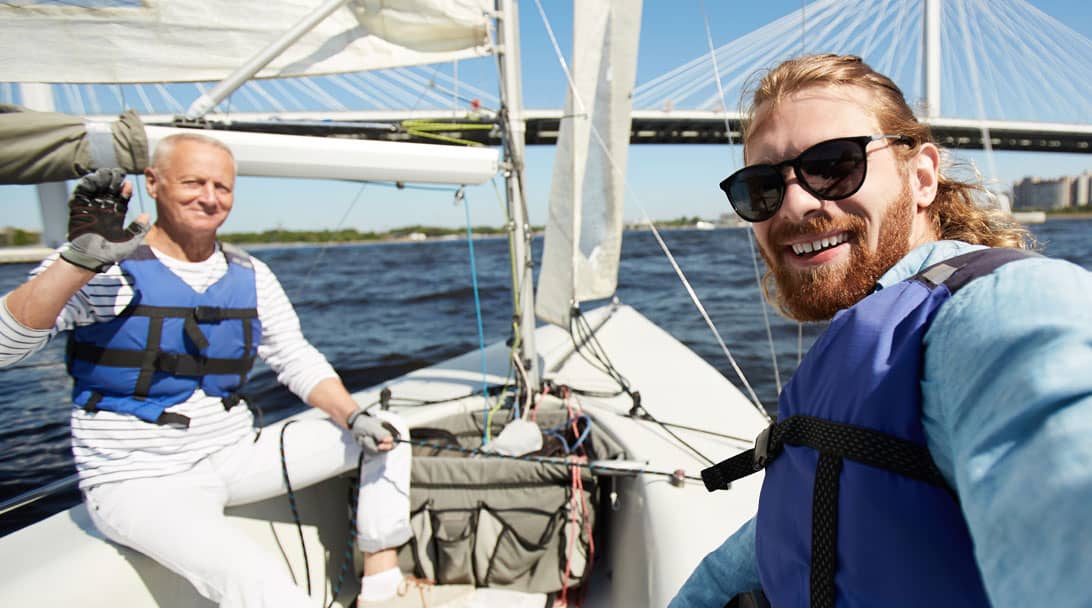The Boat Galley team member, Pamela Douglas, shares her favorite tips for how to learn about your boat. Learning all your boat’s systems and quirks can feel overwhelming. But it doesn’t have to happen all at once. If you use her suggestions, you’ll be smarter about your vessel before you realize it.
How do you learn about your boat when it’s new to you? Sure, you can start from scratch, mapping every system. It’s a great method. But, it’s time-consuming and can feel overwhelming (although Getting to Know Your Boat Systems breaks it down into an easy method). People rebuilding a damaged boat learn by doing it just that way. But what are the best options for the majority of us buying a typical, used cruising boat? After all, even a well-maintained boat has its quirks. And if you didn’t grow up on boats, you probably need basic education. So where do you begin? At the beginning, of course.
Survey
You’re spending good money on a surveyor’s advice and report. Take advantage of it. Come prepared to take notes. With the ability to document what you see in words and photos, your phone is a perfect tool for educating yourself about your new-to-you boat. If the owners are present, ask about their procedures and maintenance schedule.
A quick note about choosing a surveyor–someone who knows everything about boats but is unable to communicate clearly may not be your best choice. When you ask for recommendations and references, make sure you ask about a surveyor’s ability to explain things.
When I bought Meander, I paid extra to bring my chosen surveyor to the area where the boat was docked. He wrote for Practical Sailor magazine and his website was filled with helpful information for boat owners. His knowledge and proven communication skills convinced me he was the right fit for me, a newbie cruiser. He got bonus points for answering every one of my questions without once turning to my husband to reply.
I relied on the surveyor’s report for our first few years on the boat. When issues came up, I compared the conditions when we bought the boat to the present day. It was a helpful tool. If your survey is long past, what are other ways to learn your boat’s systems?
Marine Professionals and Diesel Technicians
Has any boat ever had a perfect survey? I doubt it. Even a well-cared-for boat will need routine maintenance or upgrades. Luckily, if you’re getting work done in a boatyard, you’re surrounded by specialists–riggers, diesel technicians, fiberglass workers, and electricians.
While replacing our propeller to send the existing feathering prop for a factory rebuild, we got to know a fabulous diesel tech. Not only was he highly skilled, but he was also a good explainer and answered tons of questions. Many marine professionals are willing to answer at least a few questions. Just remember they have busy schedules and you’re not the only boat in the yard. Show your appreciation. Some workers are allowed to accept tips. But you can also buy lunch for the yard workers. Or write a complimentary letter to the yard owner to show your appreciation. Learning something new every time someone works on your boat could save you thousands of dollars and many headaches in the future.
Generalized boat knowledge is useful. But sometimes you need more specialized information. Where do you turn? Especially if you own a rare boat?
Online Boat Owner Groups
Many boat brands have passionate user groups online. A few (I know of the Dickerson Owners Association and Pacific Seacraft Owners, in particular) plan gatherings. These groups are great for swapping equipment, sharing knowledge, and getting encouragement for those awful boat jobs we all have to do. Staff from the Pacific Seacraft factory in North Carolina sometimes participate in the boat’s Facebook group.
I found instructions for designing a custom, composting head from a fellow PSC 34 owner. And I appreciated the photos someone posted of their keel bolts so I knew what to expect when we removed our fuel tank.
Online groups are also a good source for my next suggestion.
User Manuals and Manufacturer
I was lucky to receive the original user manual for my boat and engine when I bought Meander. But other Pacific Seacraft owners pointed me in the direction of manuals for other original equipment we had onboard. Often, wonderful, anonymous boat owners have scanned manuals and saved them online. I relied heavily on the manual I found online for my Force-10 propane heater when it needed a cleaning.
I’ve also found the staff at the Pacific Seacraft headquarters to be very helpful. For example, they were able to fabricate a new propane bracket for us. And are available to provide parts you’re unlikely to find elsewhere.
Take a Course
When I took a two-day diesel maintenance course, I learned general information. But we did work on a Yanmar engine similar to Meander’s. And I’m not exaggerating when I tell you that being able to walk all the way around an engine instead of working blind from the saloon (or worse, upside down from the cockpit access) was tremendously valuable to my understanding of my boat.
In addition, the course manual and the chance to ask questions advanced my knowledge quite a bit.
Helpful Websites
Back in the day, some of the best information about boats came from internet forums. Although these are less active than they were, some information doesn’t change–especially if you own an older boat.
One site with especially good practical information is Practical Sailor (some free content; some by subscription). They offer tested information on a variety of boat systems and maintenance jobs. Declines in search quality have led great information to be more deeply hidden. But once you find good sources, bookmark them.
Books
Carolyn has recommended some great books for soon-to-be cruisers. Two that I’ve found particularly helpful are Don Casey’s Complete Illustrated Sailboat Maintenance Manual (Amazon) and Boatowner’s Mechanical and Electrical Manual by Nigel Calder (Amazon). I usually started with Casey. His book, spread over a greater variety of boat systems is, by necessity, more general.I found it a helpful starting point. Once I had a basic understanding, I would dig deeper by reading Nigel Calder.
Yeah, I know. Some of you are wondering why bother with books when you can find everything online. But the reality is that search quality has really declined in the past few years. It takes more effort to find the best information online than it does to turn to the index in a book or search for a keyword in an e-book. Apparently, I’m not the only one since these books get regular updates.
And finally, we come to my favorite way to learn boat information.
Learn from Other Cruisers
I’m an extrovert who loves chatting with cruisers. So, of course, learning from other boat owners would rank at the top for me.
I think one reason for the success of The Boat Galley is that Carolyn shares information like a friend passing on their favorite tips. Over the years, I’ve gotten all kinds of great advice from fellow cruisers. But my favorite experience was when a fellow cruiser taught me how to clean my winches. He set me up in his cockpit and talked me through the process, including some great ideas to keep me from losing fiddly little parts like pawl springs. He got one of his winches cleaned; I learned a new skill. Win-win. Cleaning winches remains one of my favorite boat maintenance chores.
Learning about your boat can feel overwhelming. But you have many options for increasing your education. Some of them are even fun–even swapping ideas for keeping joker valves operating properly can be amusing with the right company.
Did you have a unique way to learn about your boat? Share in the comments.

Pamela Douglas cruised in the Atlantic Intracoastal Waterway and Chesapeake and Delaware Bays aboard her Pacific Seacraft 34, Meander. She is a member of The Boat Galley team and developed our Cruising With Your Dog course. You can also find her favorite Atlantic coast destinations and other information about dogs at Something Wagging This Way Comes.


Leave a Reply